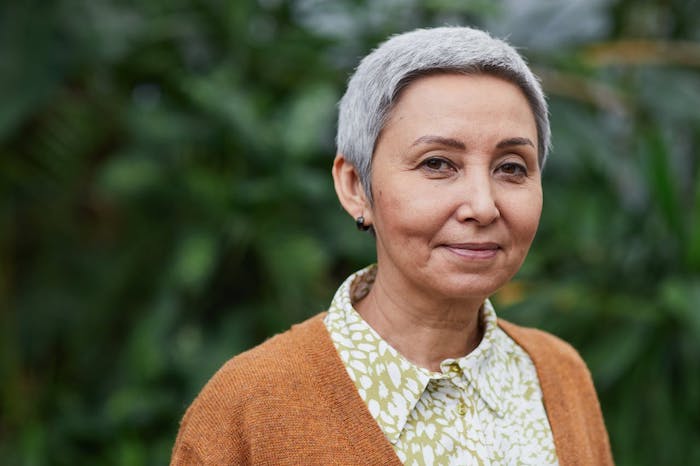Inflammation is harmful to your skin, but what is inflammation?
Simply put, it’s a type of inflammation that occurs as you age.
Aging is a complex process and recent research suggests it can contribute to subtle but chronic low-grade inflammation throughout the body.
This, in turn, can increase your risk for cardiovascular disease, kidney disease, diabetes, cancer, dementia and more.
Scientists have also found a link between inflammation and skin aging. Here’s what we know so far and what you can do to prevent this type of aging from manifesting on your skin.
Inflammation is harmful to your skin: how it happens
As we age, the skin undergoes various changes. It may become drier and thinner, while collagen and elastin production decreases, resulting in sagging and sagging. One reason for this is the low-grade inflammation that can occur throughout the body.
Inflammation is usually a healthy part of the immune system. When you cut yourself, the immune system sends cells to the area to help it repair. Part of that process includes the redness and swelling you may see around the wound, which will go away once the wound has healed.
However, chronic inflammation is thought to be a malfunction of the immune system. Instead of winding up and then calming down, the inflammation continues with a low hum. This type of inflammation can be caused by many factors, including environmental stressors such as the following:
- ultraviolet radiation
- the use of toxic or aggressive ingredients in skin care products
- over-exfoliating
- chemicals in skin care and makeup
- medical treatments
- pollution
- poor nutrition
- lack of exercise
However, aging itself also increases the risk of chronic inflammation, which is why scientists now call it ‘inflammaging’.
Inflammation is harmful to your skin: what happens to the skin
Inflammation leads to various changes in the skin that contribute to aging.
Collagen breakdown
Inflammatory cytokines in the blood break down collagen, resulting in a loss of firmness and elasticity of the skin.
Increased oil production
Inflammation can lead to increased production of sebum (skin oil), which can cause acne or worsen skin conditions such as rosacea.
Oxidative stress
Inflammation generates free radicals: unstable, destructive molecules that can damage skin cells and accelerate aging.
Reduced barrier function
Chronic inflammation compromises the skin barrier, making it more sensitive to irritants, allergens, moisture loss and infections. All of this can also increase inflammation in the skin.
Additionally, a weakened skin barrier will not retain hydration, resulting in dryness, dullness, redness, irritation and other skin conditions.
Inflammation damages your skin and possibly the rest of your body
Exciting early research into inflammation indicates that if you reduce inflammation in the skin, you can also reduce it in the body.
In one Study from 2019 at the University of California, San Francisco, for example, scientists found that when participants between the ages of 58 and 95 applied a skin-repairing cream all over their bodies twice a day for 30 days, their levels of inflammatory cytokines fell compared to their normal levels. before they started using the cream.
In fact, using the cream lowered their cytokine levels to almost equal those of people in their 30s. The cream also improved skin hydration, lowered pH and restored the outer barrier.
This suggests that rejuvenating the skin can reverse inflammation throughout the body – which ties in with another interesting idea the researchers had. What if the chronic inflammation that typically affects older people? originates in the skin?
Until now, we don’t know why inflammation levels increase as we age. Theories have pointed to an immune system malfunction or perhaps a liver problem. But these scientists theorized that the inflammation must come from an organ large enough for a very small level of inflammation in that organ to affect the entire body.
“The skin is a good candidate for this because of its size,” says senior study author Mao-Qiang Man, MD. “It could be that the skin has very mild inflammation, and because it is such a large organ, it increases circulating cytokine cells.”

Inflammation is harmful to your skin: how to stop it
It will be interesting to see what the research reveals in the future. One thing is clear: keeping your skin healthy is also a great way to keep the rest of your body healthy!
How can you reduce inflammation to promote healthier, younger-looking skin?
Try these tips.
Eat an anti-inflammatory diet
What you eat can significantly affect inflammation levels in your body. Choose foods rich in antioxidants and anti-inflammatory substances to prevent skin aging. Good options include fruits and vegetables, leafy greens, healthy fats (such as those found in oily fish, flax seeds and walnuts), and spices (such as turmeric, garlic, pepper and basil).
Stay hydrated
Drinking plenty of water helps flush out toxins and keep your skin hydrated from within. In addition to drinking eight glasses of water a day, try adding water-rich foods such as melons, cucumbers and oranges to your diet.
Limit environmental/lifestyle stressors
Several environmental and lifestyle factors can cause inflammation. Wear sunscreen to protect yourself from UV rays, avoid smoking and excessive alcohol consumption, reduce your exposure to outdoor pollution and minimize stress. Chronic stress can worsen inflammation in the body.
Add anti-inflammatory ingredients to your skin care
As noted in the research above, regularly applying anti-inflammatory ingredients to your skin can help reduce inflammation.
CV Skinlabs products are created to help reduce inflammation and keep skin healthy. All our products contain our patented Tri-Rescue Complex, a blend of powerful anti-inflammatory ingredients with a high antioxidant profile, designed to help repair the skin barrier and restore skin health and radiance.
They contain the following ingredients (and more) designed to keep inflammation at bay:
- Curcumin: Curcumin is derived from turmeric and has powerful anti-inflammatory properties. It can reduce the production of inflammatory cytokines and promote skin healing.
- Aloe vera: Aloe vera has a long reputation for helping reduce inflammation in the skin. It also reduces redness and irritation.
- Centella Asiatica: Also known as Gotu Kola, this plant extract helps stimulate collagen production and reduce inflammation. It is particularly effective for sensitive skin.
- Reishi mushroom: Prized for its anti-inflammatory and antioxidant properties, reishi also helps strengthen the skin barrier and protects against environmental stressors.
- Bisabolol: Bisabolol, a natural compound derived from chamomile, is known for its soothing effects on the skin. It helps reduce redness and inflammation and works great for sensitive types.
Shop our CV Skinlabs product line today. Use all or all of them to reap the benefits of daily inflammation protection.
Have you heard that inflammation damages your skin?
Featured image by Marcus Aurelius via Pexels.






